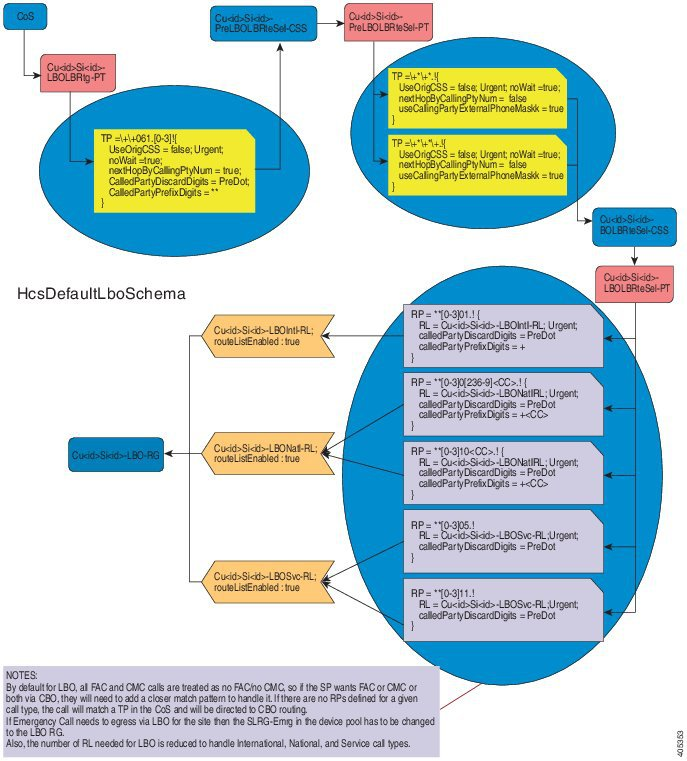Local Breakout (LBO) Workflows#
In addition to centralized breakout using the aggregation layer, customers can also connect to PSTN through a local gateway. Using a local gateway is also referred to as Local Breakout (LBO). For LBO, each site or location requiring LBO is equipped with a local gateway. When a local gateway is added to a location, the administrator defines the call types that can be routed through the local gateway. For example, you can select national calls to be routed through the local gateway. By default, all call types are routed by LBO.
Enable Local Break Out Custom Workflows#
If you have done a fresh install of Cisco Unified CDM 10.6(2) or later, your Type 1-4 Cisco Dial Plan Schema Group will already have the following Local Break Out (LBO) custom workflows specified:
associateLboGateway
unassociateLboGateway
However, if you have upgraded from a pre-10.6(2) version, you must update your Dial Plan Schema Group to enable these custom workflows, if you want to use Local Break Out.
Log in as the provider administrator.
Select Dial Plan Management > Advanced Configuration > Dial Plan Schema Group.
Select the appropriate schema group that is in use by your customer.
Click the Custom Workflows tab.
Add the following Dial Plan Event to Workflow bindings:
associateLboGateway > HcsDefaultAddLBOGatewayPWF
unassociateLboGateway > HcsDefaultDelLBOGatewayPWF
Click Save.
associateLboGateway Custom Workflow#
The associateLboGateway custom workflow is optional. If it is not specified in the customer’s Dial Plan Schema Group, when a SIP Local Gateway is associated with a site only the IOS Command Builders are triggered.
The HcsDefaultAddLBOGatewayPWF is triggered every time a SIP Local Gateway is associated with a site and executes the following logic:
If the site-specific Cu<cid>Si<sid>-LBO-RG route group doesnaEUR(TM)t exist, it is created with the SIP Trunk associated with the SIP Local Gateway as a member device.
If the site-specific Cu<cid>Si<sid>-LBO-RG route group exists, it is updated to include the SIP Trunk associated with the SIP Local Gateway as a member device.
For line-based routing (LBR), the HcsDefaultLboSchema is deployed.
Figure 7. HcsDefaultLboSchema

For device-based routing (DBR), if this is the first SIP Local Gateway associated to the site, the site default device pool Cu<cid>Si<sid>-DevicePool is updated, such that all the default Local Route Groups are set to the new Cu<cid>Si<sid>-LBO-RG.
Once a SIP Local Gateway is associated with a site and the HcsDefaultLboSchema dial plan schema has been deployed, the Cu<cid>Si<sid>-LBOLBRtg-PT route partition can be used when constructing a site line-based routing (LBR) Class of Service (CoS) that uses local break-out.
Note
The LBR CoS must be defined such that the LBOLBRtg-PT (used for LBO) is higher priority than the LBRtg-PT [used for Central Break-out (CBO)].
By default, when more SIP Local Gateways are associated to the same site, the Cu<cid>Si<sid>-LBO-RG route group is updated to include the additional SIP Trunk associated with the additional gateway. The trunks in this route group use the Top Down distribution algorithm.
unassociateLboGateway Custom Workflow#
The unassociateLboGateway custom workflow is required only if associateLboGateway is enabled. If it is not specified in the customer’s Dial Plan Schema Group, when a SIP Local Gateway is disassociated from a site only the IOS Command Builders are triggered.
The HcsDefaultDelLBOGatewayPWF is triggered every time a SIP Local Gateway is disassociated from a site and executes the following logic:
Update the site-specific Cu<cid>Si<sid>-LBO-RG route group to remove the SIP Trunk associated with the SIP Local Gateway as a member device.
For line-based routing (LBR), if this is the last SIP Local Gateway associated with the site, the Translation Patterns are removed from the Cu<cid>Si<sid>-LBOLBRtg-PT route partition. Removing the Translation Patterns forces the class of service CSS’s that use LBO to fall back to central break-out (CBO).
For device-based routing (DBR), if this is the last SIP Local Gateway associated with the site, the site default device pool, Cu<cid>Si<sid>-DevicePool, is updated such that all the default Local Route Groups are no longer associated with Cu<cid>Si<sid>-LBO-RG.
